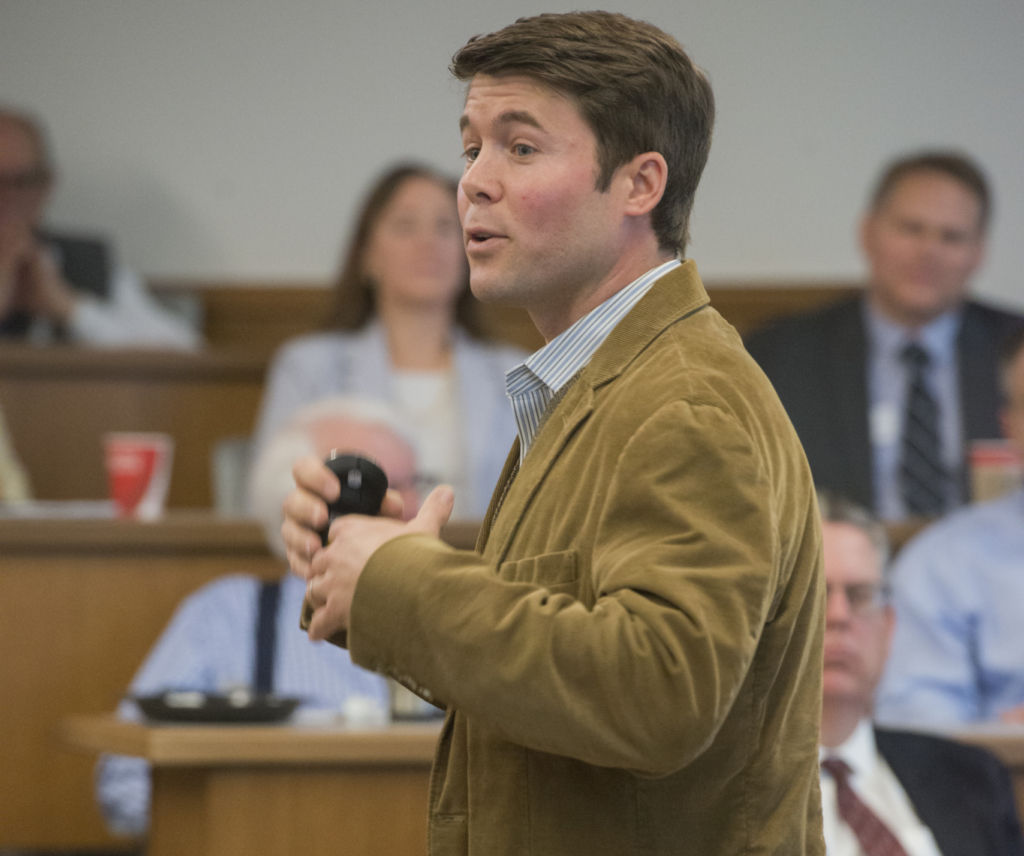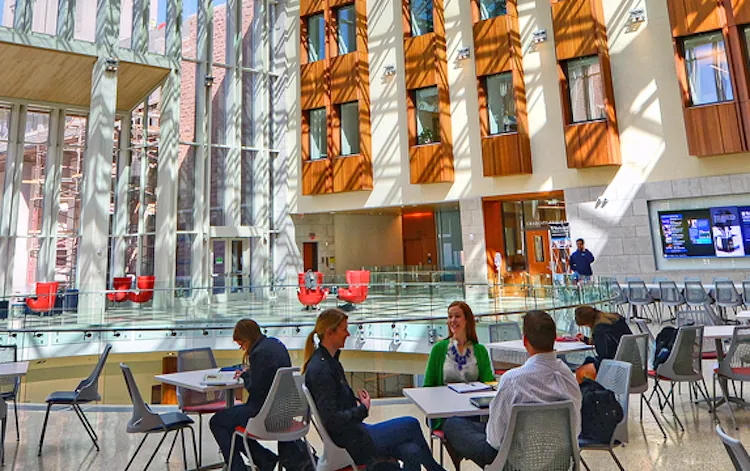
Andrew Knight, professor of Olin Business School, instructs a class. Courtesy photo
Are there certain courses that you think business schools need to be teaching now that perhaps they’re not because of the inertia?
This is one that I’m thinking about quite a bit right now, and I don’t know whether it is trivial, or whether it’s going to be around long term. But, I’ve watched my kids get really into the Metaverse and really into VR. I’m watching experimentation there and seeing the growth of the digital economy in the Metaverse. It is a place where I am concerned but also excited for business schools to start pushing more fully.
My area of expertise is teamwork and leadership, and so as I think about the meaning of virtual collaborations where we can literally, in an instance, change our appearance or mask things about ourselves. It’s a very different context than where much of the research and historical curriculum on teamwork has been. So, I’m actually experimenting this summer with our MBA students, doing some virtual reality based teamwork exercises. It’s not a dedicated course on collaboration in the Metaverse, or it’s not a dedicated course on digital marketing and branding in the Metaverse. I think those are places where I see personally a lot of excitement, but at the same time, who knows: Is Metaverse going to be a crypto currency longtail fizzle out, or is it going to be an explosion of activity?
Are there any trends in the MBA or business education that have you excited?
I am really excited about the ways that COVID has disrupted and sparked innovation. I think the increasing demands, especially in professional programs, for flexibility, are places that are at once exciting and challenging. For residential programs as well as, frankly, for online fully online programs, where we want to help people build their professional networks, I think it’s going to continue to take some real creative thinking to at once provide flexibility and accessibility amidst busy lives and the shift to hybrid work modalities, while still providing vehicles for people to develop those meaningful, long-term sustainable relationships that enrich both their professional and their personal lives.
Despite other warning signs of the economy, unemployment is still low and the job market is still hot. How does that impact a person’s decision to get an MBA? Do you see increased competition not only between schools, but also between employers and schools, for top MBA candidates?
I think the availability of options, right now, is incredibly high. So yes, I think there are maybe higher opportunity costs right now for folks to enter into an MBA program.

Washington University in St. Louis’ Olin Business School.
Another piece that feeds into that is we’re in a bit of this settling time when it comes to COVID. We are starting to reestablish new routines and new habits, and those are very different to what we were doing. There’s also a bit of a tightening that’s simply a function of how we were all massively disrupted over the past couple of years, and entering into a new educational program is, in some ways, a volitional disruption to your life. I think there’s a little bit of a period of exhaustion where the idea of embarking on something brand new may feel less exciting right now.
How would you describe the value of the MBA today?
I think that in terms of intrinsic desire, it can be a real source of growth, development and fulfillment, but also it remains something that does differentiate people within the job market. It remains a valuable credential as a signaling mechanism, certainly, but also something that enables people to be more effective in their positions after they leave the program. So I think the data there still remains clear.
One thing that I am especially intrigued to see is, as we do progress into a time period when workplaces will become increasingly dominated by remote and hybrid workforces, there may increasing value in formal signals of competence, credibility and legitimacy because people will have less visibility and less connection on an ongoing basis in the workplace. This is an hypothesis. There’s some research, I think, that’s warranted here to test this. What we know from some research on signaling is that when you lose those familiar connections, some of the formal signals of competence and credibility tend to rise in importance. But again, it’s an open research question that certainly warrants some data.
Speaking about those formal signals of competence, and with the explosion of online MBA programs in the last couple of years, do you think the online degree will become as valuable a signifier? Or is the in-person experience still the best signifier of what an MBA can offer?
I think that the online degree will reach parity with a traditional full-time, residential degree in terms of just signaling value. I think in the past there was a slight denigration of online or distance learning, that it felt second class. I just think that is rapidly evaporating.
That’s a consequence of premier, blue chip institutions engaging in online and hybrid programs. It’s also a consequence of the traditional, professional MBA programs becoming this mixed gray zone. So rather than what we had before–which was a discrete difference between residential, in-person programs or fully online programs–we now have this continuum between the two. When we change from discrete to continuum in people’s minds, they start to lose the difference between the two and become one in the same.
The place where I think residential programs, per my earlier comments, will still really stand out is in some of those side and indirect benefits of an MBA program: Building professional relationships and, perhaps especially for people who are looking to make more radical career shifts who may really benefit from intensive on site career coaching. That’s a place where you may find some differentiation with the residential programs. But just in terms of the psychology of perceiving the brand, I think that is very quickly going to be a thing of the past.
What advice do you have for people considering an MBA or graduate business education? What questions should they ask and where should they look for answers?
I think the first step is the introspection piece and really engaging in that deep thought process: What is it that you’re hoping to gain from a program? Why would you spend that amount of money and time in an MBA program? I think that provides the playbook for asking the subsequent set of questions: Which program is right for you–whether that is online, hybrid or fully residential? Is it prudent to wait a couple of years and go into an executive program? What is the difference between the schools’ offerings? I think the questions all have to flow from purpose and a true understanding of what you’re hoping to achieve. A little bit of professional goal setting, I think, opens the door to those questions.
DON’T MISS: ECONOMY’S IMPACT ON MBA APPLICATIONS: 4 DEANS, 4 VIEWS AND‘THIS IS ALL BULLSH*T’: INVESTMENT BANKERS SOUND OFF ON LOUSY HOURS, BAD PAY & RUINED RELATIONSHIPS





Questions about this article? Email us or leave a comment below.